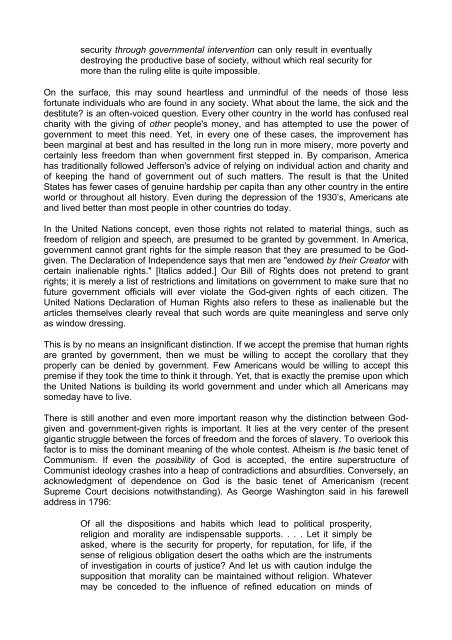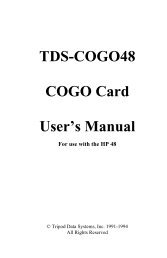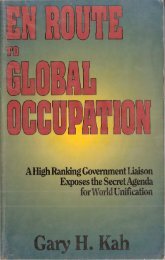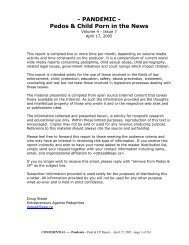G. Edward Griffin - The Fearful Master - PDF Archive
G. Edward Griffin - The Fearful Master - PDF Archive
G. Edward Griffin - The Fearful Master - PDF Archive
Create successful ePaper yourself
Turn your PDF publications into a flip-book with our unique Google optimized e-Paper software.
security through governmental intervention can only result in eventually<br />
destroying the productive base of society, without which real security for<br />
more than the ruling elite is quite impossible.<br />
On the surface, this may sound heartless and unmindful of the needs of those less<br />
fortunate individuals who are found in any society. What about the lame, the sick and the<br />
destitute? is an often-voiced question. Every other country in the world has confused real<br />
charity with the giving of other people's money, and has attempted to use the power of<br />
government to meet this need. Yet, in every one of these cases, the improvement has<br />
been marginal at best and has resulted in the long run in more misery, more poverty and<br />
certainly less freedom than when government first stepped in. By comparison, America<br />
has traditionally followed Jefferson's advice of relying on individual action and charity and<br />
of keeping the hand of government out of such matters. <strong>The</strong> result is that the United<br />
States has fewer cases of genuine hardship per capita than any other country in the entire<br />
world or throughout all history. Even during the depression of the 1930’s, Americans ate<br />
and lived better than most people in other countries do today.<br />
In the United Nations concept, even those rights not related to material things, such as<br />
freedom of religion and speech, are presumed to be granted by government. In America,<br />
government cannot grant rights for the simple reason that they are presumed to be Godgiven.<br />
<strong>The</strong> Declaration of Independence says that men are "endowed by their Creator with<br />
certain inalienable rights." [Italics added.] Our Bill of Rights does not pretend to grant<br />
rights; it is merely a list of restrictions and limitations on government to make sure that no<br />
future government officials will ever violate the God-given rights of each citizen. <strong>The</strong><br />
United Nations Declaration of Human Rights also refers to these as inalienable but the<br />
articles themselves clearly reveal that such words are quite meaningless and serve only<br />
as window dressing.<br />
This is by no means an insignificant distinction. If we accept the premise that human rights<br />
are granted by government, then we must be willing to accept the corollary that they<br />
properly can be denied by government. Few Americans would be willing to accept this<br />
premise if they took the time to think it through. Yet, that is exactly the premise upon which<br />
the United Nations is building its world government and under which all Americans may<br />
someday have to live.<br />
<strong>The</strong>re is still another and even more important reason why the distinction between Godgiven<br />
and government-given rights is important. It lies at the very center of the present<br />
gigantic struggle between the forces of freedom and the forces of slavery. To overlook this<br />
factor is to miss the dominant meaning of the whole contest. Atheism is the basic tenet of<br />
Communism. If even the possibility of God is accepted, the entire superstructure of<br />
Communist ideology crashes into a heap of contradictions and absurdities. Conversely, an<br />
acknowledgment of dependence on God is the basic tenet of Americanism (recent<br />
Supreme Court decisions notwithstanding). As George Washington said in his farewell<br />
address in 1796:<br />
Of all the dispositions and habits which lead to political prosperity,<br />
religion and morality are indispensable supports. . . . Let it simply be<br />
asked, where is the security for property, for reputation, for life, if the<br />
sense of religious obligation desert the oaths which are the instruments<br />
of investigation in courts of justice? And let us with caution indulge the<br />
supposition that morality can be maintained without religion. Whatever<br />
may be conceded to the influence of refined education on minds of



![Robert T McQuaid [rtmq@stn.net] Sent: Friday, October 29, 2004 12 ...](https://img.yumpu.com/51070071/1/190x245/robert-t-mcquaid-rtmqstnnet-sent-friday-october-29-2004-12-.jpg?quality=85)







